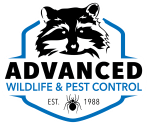What are Raccoon Roundworms?
--
How Raccoon Roundworm Spreads
Anyone who is exposed to environments where raccoons frequent is potentially at risk, especially homes with a raccoon infestations. Young children are particularly vulnerable since they are more likely to put contaminated fingers, soil, or objects into their mouths.
When a person ingests these eggs, they hatch into larvae in the intestine and can migrate throughout the body, affecting various organs and muscles. Depending on where the larvae travel, a Baylisascaris infection can impact the brain, spinal cord, eyes, and other organs.
According to the CDC, “fewer than 25 cases of Baylisascaris disease have been documented in the United States. However, it is possible that some cases are incorrectly diagnosed as other infections or go undiagnosed. Cases that are diagnosed tend to be severe.”
--
Symptoms
- Nausea
- Tiredness
- Liver enlargement
- Loss of coordination
- Lack of attention to people and surroundings
- Loss of muscle control
- Blindness
- Coma

